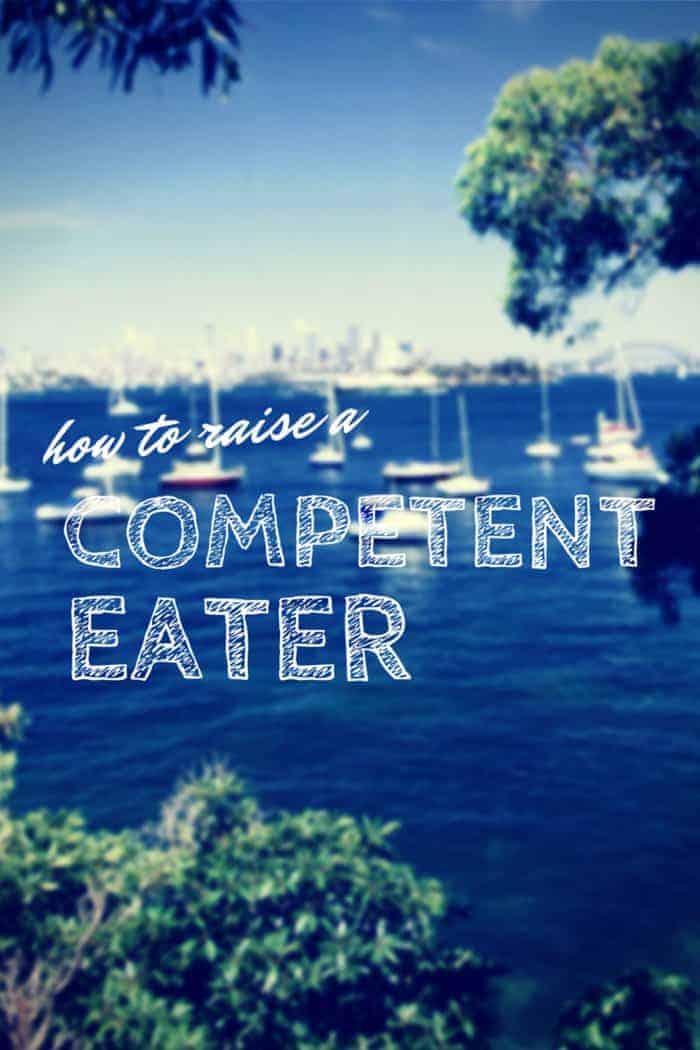
[pullquote cite=”Mr. Google” type=”left, right”]Competent: having the necessary ability, knowledge, or skill to do something successfully.[/pullquote]
This post contains affiliate links. Thank you in advance for supporting Smart Nutrition.
How can we raise our children to be competent eaters?
Some kids have it in them naturally. The other day I observed a friend’s family eating dinner. When dessert was served, there were options: chocolate chip cookies, cream puffs, or whole wheat spelt blueberry muffins. My friend’s older son chose the muffin. Her younger son chose the cookie. Same household, same parenting style, two different choices.
If your kid chooses fruit over chocolate, you’ve won the kid lottery. No mealtime battles with that one! But what about the kid who chooses chocolate?
Sometimes the long-term view is needed.
The Division of Responsibility
Ellyn Satter, a renowned dietitian and social worker, has dedicated her life’s work to educating people about how to raise competent eaters. She developed a feeding plan to help raise healthy eaters, called the division of responsibility. It divides up the various responsibilities in feeding and assigns them to either the parent (caregiver) or the child. Each party should keep to their responsibilities. Neither party should take over for the other.
The responsibilities of the caregiver:
-What food is purchased and offered to the child
-When food is offered
-Where food is offered
The responsibilities of the child:
-To decide which of the foods offered he will eat (all, none, or a selection)
-How much she will eat
And that’s that! The framework is simple but the implementation can be challenging.
At one meal, your child may decide to eat only rice, foregoing the broccoli and chicken. If you took a short-term view, you might look at this as a failure. But forcing the child to eat more than a bite of something he doesn’t want will only create negative associations with the food and make him more determined to avoid it in the future. If you take the long-term view, you can relax, knowing that he will learn to like broccoli and chicken in his own time.
A competent eater (according to Ellyn Satter):
-has positive associations with food and eating
-has developed skills to accept new foods and keeps expanding their eating repertoire
-listens and responds to the internal signals of hunger and fullness
These things take time. Think back to when you were a child. Did the ways in which your parents address feeding either help or hinder you in becoming a competent eater? On a scale of 1-10, how would you rate yourself on the above three aspects?
For more in-depth reading on the topic, I highly recommend Ellyn Satter’s books, especially Child of Mine: Feeding with Love and Good Sense, Revised and Updated Edition and Secrets of Feeding a Healthy Family: How to Eat, How to Raise Good Eaters, How to Cook
[share title=”Share This Article” facebook=”true” twitter=”true” google_plus=”true” linkedin=”true” pinterest=”true” reddit=”true” email=”true”]


Hi there would you mind letting me know which web host you’re working with?
I’ve loaded your blog in 3 different web browsers
and I must say this blog loads a lot quicker then most.
Can you recommend a good internet hosting provider at a honest price?
Cheers, I appreciate it!
Hi!
Thanks for asking. Glad to hear a real report that the site loads fast! We are hosted by
http://www.bluehost.com/track/smartnutrition/SmartNutrition
We initially signed up for the basic plan but recently upgraded to the “cloud” plan.
I hope that helps! (disclosure: if you sign up through the link above, you won’t pay a higher price but I would get a commission for referring you!.
Thanks!